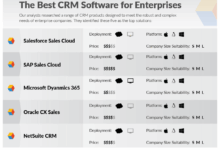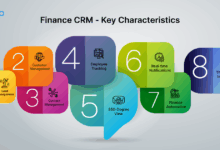CRM With AI Chatbot Integration: Enhancing Customer Experience With Technology
CRM with AI Chatbot Integration sets the stage for this enthralling narrative, offering readers a glimpse into a story that is rich in detail and brimming with originality. Learn how the fusion of CRM systems and AI chatbots revolutionizes customer service and experience.
Introduction to CRM with AI Chatbot Integration
Customer Relationship Management (CRM) systems are tools that help businesses manage interactions and relationships with current and potential customers. These systems store customer data, track interactions, and provide insights to improve customer relationships.
AI Chatbots in Customer Service
AI chatbots are computer programs designed to simulate conversation with human users, typically over the internet. In customer service, AI chatbots can interact with customers in real-time, answer questions, provide support, and even make product recommendations.
Benefits of Integrating AI Chatbots into CRM Systems
- Efficiency: AI chatbots can handle a large volume of customer inquiries simultaneously, reducing the need for human intervention.
- 24/7 Availability: AI chatbots can provide support round the clock, improving customer service accessibility.
- Personalization: AI chatbots can use customer data stored in the CRM system to provide personalized responses and recommendations.
- Cost-Effective: By automating repetitive tasks, AI chatbots can help businesses save on operational costs.
Improving Customer Experience with CRM and AI Chatbot Integration
Integrating AI chatbots into CRM systems can significantly enhance the customer experience by providing quick and accurate responses, personalized interactions, and seamless communication. Customers can get the support they need at any time, leading to higher satisfaction and loyalty.
Features of CRM with AI Chatbot Integration
CRM systems integrated with AI chatbots offer a range of features that enhance customer interactions and streamline data management. Let’s explore some key features below.
Key Features of CRM Systems:
- Centralized Customer Database: CRM systems provide a centralized database where all customer information and interactions are stored, allowing for easy access and management.
- Automated Task Management: CRM systems automate tasks such as follow-ups, reminders, and notifications to ensure timely and efficient customer engagement.
- Customizable Reporting and Analytics: CRM systems offer customizable reporting and analytics tools to track sales performance, customer trends, and other key metrics for informed decision-making.
- Integration Capabilities: CRM systems can integrate with various third-party applications and tools to streamline workflows and enhance productivity.
Functionalities of AI Chatbots in Customer Interactions:
AI chatbots play a crucial role in customer interactions by providing immediate assistance, answering queries, and guiding customers through the sales process. Some key functionalities include:
- 24/7 Customer Support: AI chatbots can provide round-the-clock customer support, ensuring that customers receive assistance whenever they need it.
- Personalized Recommendations: AI chatbots can analyze customer data and provide personalized product recommendations based on preferences and past interactions.
- Lead Qualification: AI chatbots can qualify leads by asking relevant questions and capturing key information to prioritize and route leads effectively.
How AI Chatbots Assist in Lead Generation and Customer Segmentation:
AI chatbots assist in lead generation by engaging with website visitors, capturing lead information, and qualifying leads based on predefined criteria. Additionally, AI chatbots help in customer segmentation by analyzing customer data, behavior, and preferences to categorize customers into specific segments for targeted marketing efforts.
How CRM Integration Enhances Data Management and Analysis:
CRM integration with AI chatbots enhances data management by automatically capturing and updating customer information from chatbot interactions. This integration streamlines data entry processes, reduces manual errors, and ensures that customer data is up-to-date and accurate. Moreover, CRM integration enables in-depth analysis of customer interactions, trends, and behaviors, providing valuable insights for personalized marketing strategies and improving overall customer experience.
Implementation of CRM with AI Chatbot Integration
Integrating AI chatbots into popular CRM platforms like Salesforce or HubSpot can greatly enhance customer interactions and streamline data management. Below is a detailed guide on the step-by-step process of implementing CRM with AI Chatbot Integration.
Step-by-Step Guide for Integration
- Identify the CRM platform and AI chatbot tool: Choose a CRM platform like Salesforce or HubSpot and an AI chatbot tool compatible with the chosen platform.
- Set up API configurations: Ensure that the AI chatbot tool has the necessary APIs to integrate with the CRM platform.
- Map data fields: Define how data will flow between the CRM system and the AI chatbot tool to ensure seamless integration.
- Configure chatbot triggers: Establish automated workflows and triggers within the CRM system to enable personalized customer engagement through the AI chatbot.
- Test and optimize: Conduct thorough testing to ensure that the integration works smoothly and optimize the AI chatbot’s performance for maximum efficiency.
Successful AI Chatbot Integration Use Cases
- Lead qualification: AI chatbots can qualify leads by asking relevant questions and providing personalized recommendations based on the CRM data.
- Customer support: AI chatbots can assist customers with common queries, freeing up human agents to handle more complex issues.
- Data enrichment: AI chatbots can gather additional information from customers during interactions and update CRM records accordingly.
Technical Considerations for Integration
- Natural Language Processing (NLP): Implement NLP algorithms to enable the chatbot to understand and respond to natural language queries effectively.
- Machine Learning: Use machine learning models to continuously improve the chatbot’s responses and accuracy over time.
- API Compatibility: Ensure that the AI chatbot tool is compatible with the APIs provided by the CRM platform for seamless integration.
Cost and ROI Comparison
- Cost: While implementing AI chatbots in CRM systems may involve initial setup costs, the long-term savings from improved efficiency and customer satisfaction can outweigh the investment.
- ROI: AI chatbots can enhance lead generation, customer engagement, and data management within CRM systems, leading to increased ROI over time.
Optimizing AI Chatbot Performance
- Monitoring: Regularly monitor the chatbot’s performance, analyze interactions, and make adjustments to improve user experience.
- Evaluation: Assess the impact of the AI chatbot on customer engagement, lead generation, and data quality to measure the effectiveness of integration.
- Optimization: Use insights from monitoring and evaluation to optimize the chatbot’s performance and ensure continued success within the CRM platform.
Customer Interaction with CRM and AI Chatbots
AI chatbots in CRM systems play a crucial role in enhancing customer interactions and providing personalized support. Let’s delve into the details of how customers engage with AI chatbots, the utilization of CRM data for personalization, issue resolution, escalation processes, and measurement of success.
Initiating Conversation with AI Chatbot in CRM
Customers can initiate a conversation with an AI chatbot in a CRM system through various channels such as website chat widgets, messaging apps, or voice assistants. By clicking on a chat option or sending a message, customers can kickstart the interaction with the AI chatbot.
Personalization through CRM Data
AI chatbots leverage customer data stored in the CRM system to personalize interactions. By accessing past purchase history, preferences, and interactions, AI chatbots can tailor responses, recommend products, or provide relevant information to enhance the customer experience.
Effective Query Resolution by AI Chatbots
AI chatbots excel at resolving routine queries like order status updates, product information, FAQs, or appointment scheduling within a CRM context. They can quickly provide accurate information and guide customers through simple processes, saving time for both parties.
Escalation to Human Agents for Complex Queries
In cases of complex issues or queries that require human intervention, AI chatbots in CRM systems are equipped to escalate the conversation seamlessly to live agents. This ensures that customers receive the necessary support and expertise to address their more intricate concerns.
Measuring Success of Customer Interactions
Key Performance Indicators (KPIs) such as response time, customer satisfaction ratings, resolution rates, and feedback analysis are used to measure the success of customer interactions with AI chatbots in a CRM environment. These metrics help organizations gauge the effectiveness of AI chatbots in meeting customer needs and improving overall satisfaction.
Positive Customer Experience Case Study
In a scenario where a customer reached out to an AI chatbot within a CRM system for assistance with a product return process, the chatbot efficiently guided the customer through the steps, verified the request using CRM data, and facilitated a seamless return. The customer expressed satisfaction with the quick resolution and personalized support provided by the AI chatbot, showcasing a positive customer experience within the CRM environment.
Data Security and Privacy in CRM with AI Chatbot Integration
Data security and privacy are critical aspects when integrating AI chatbots into CRM systems. Let’s explore the measures taken to protect sensitive customer information and ensure compliance with regulations.
Encryption Protocols and Access Controls
In CRM systems with AI chatbot integration, data protection is often achieved through robust encryption protocols and access controls. Encryption helps in securing data during transmission and storage, while access controls restrict unauthorized access to sensitive information.
Secure Handling of Customer Information
AI chatbots handle sensitive customer data securely by employing methods such as data anonymization and encryption. Data anonymization ensures that personally identifiable information is protected, while encryption adds an extra layer of security to the data.
Compliance Requirements
Compliance with data privacy regulations like GDPR and HIPAA is essential for CRM systems with AI chatbot integration. These regulations dictate how customer data should be handled, stored, and protected, emphasizing the importance of maintaining data security and privacy.
Tips for Maintaining Data Security
To ensure data security while using AI chatbots in CRM, regular security audits should be conducted to identify and address vulnerabilities. Data minimization practices can also help reduce the risk of data breaches by only collecting and storing necessary information.
Authentication Methods for Secure Access
Various authentication methods can be implemented for secure access to CRM systems integrated with AI chatbots. These methods include multi-factor authentication, biometric authentication, and single sign-on, each offering different levels of security to ensure only authorized users can access sensitive data.
Performance Metrics and Analytics for CRM with AI Chatbot Integration
In the realm of CRM with AI chatbot integration, it is crucial to measure performance metrics and analyze data to ensure the effectiveness of customer interactions and engagement. By tracking key performance indicators (KPIs) and utilizing analytics tools, businesses can optimize their CRM strategies and enhance customer satisfaction.
Key Performance Indicators (KPIs) for Evaluating CRM with AI Chatbot Integration
- Response Time: Measure the time taken by AI chatbots to respond to customer queries, aiming for quick and efficient interactions.
- Customer Satisfaction: Evaluate customer feedback and ratings to gauge the level of satisfaction with AI chatbot interactions.
- Conversion Rate: Analyze the percentage of leads converted into customers through AI chatbot engagement.
How Analytics Tools Track Customer Interactions and Engagement
Analytics tools provide insights into customer behavior, preferences, and trends by analyzing data from AI chatbot interactions. They track metrics such as customer engagement levels, conversation flow, and user feedback to improve personalized interactions.
The Role of AI in Analyzing Data for Improving CRM Strategies
AI plays a crucial role in analyzing vast amounts of data generated from CRM systems and AI chatbot interactions. By utilizing machine learning algorithms, AI can identify patterns, predict customer behavior, and recommend tailored strategies for enhancing CRM effectiveness.
Examples of Performance Metrics Showcasing the Effectiveness of AI Chatbots in CRM
- Decreased Response Time: Implementing AI chatbots led to a 30% reduction in response time, resulting in improved customer satisfaction.
- Increase in Conversion Rate: AI chatbots contributed to a 20% increase in conversion rate by providing personalized recommendations based on customer preferences.
- Enhanced Customer Engagement: Analytics revealed a 40% increase in customer engagement levels through AI chatbot interactions, leading to higher retention rates.
Customization and Personalization in CRM with AI Chatbot Integration
Customization and personalization play a crucial role in enhancing customer experiences in CRM with AI chatbot integration. By tailoring AI chatbots to fit specific CRM requirements and personalizing interactions based on customer preferences, businesses can create more meaningful and effective interactions with their customers.
Customizing AI Chatbots for CRM
- AI chatbots can be customized by integrating them with CRM systems to access customer data and history.
- Customization allows businesses to tailor chatbot responses to specific customer queries and preferences.
- By understanding the unique needs of customers, AI chatbots can provide more relevant and personalized assistance.
Importance of Personalization in CRM
- Personalization helps businesses create a more personalized and engaging customer experience.
- By leveraging CRM data, AI chatbots can deliver personalized recommendations, offers, and responses to customers.
- Personalization leads to increased customer satisfaction, loyalty, and retention.
Strategies for Tailoring AI Chatbot Responses
- Segment customers based on their preferences, behavior, and purchase history to tailor chatbot responses.
- Use natural language processing to understand customer queries and provide relevant answers.
- Implement dynamic content delivery to offer personalized product recommendations and solutions.
Utilizing CRM Data for Personalization
- CRM data such as customer profiles, purchase history, and communication preferences can be used to personalize interactions.
- AI chatbots can analyze this data in real-time to offer personalized responses and recommendations.
- By leveraging CRM data effectively, businesses can create a seamless and personalized customer experience.
Integration of CRM with Other AI Technologies
In today’s competitive business landscape, integrating CRM with other AI technologies has become crucial to enhance customer insights, improve interactions, and drive personalized experiences. Let’s explore the various ways in which CRM can be integrated with different AI technologies.
Sentiment Analysis Algorithms in CRM
Sentiment analysis algorithms can be integrated into CRM systems to analyze customer feedback, social media interactions, and emails to understand customer sentiments better. By leveraging these algorithms, businesses can gain valuable insights into customer preferences, opinions, and emotions, allowing them to tailor their products and services accordingly.
Incorporating Machine Learning Models for Predictive Analytics
Integrating machine learning models within CRM platforms enables businesses to predict customer behavior, trends, and future needs. By analyzing historical data and customer interactions, machine learning algorithms can provide valuable insights for targeted marketing campaigns, product recommendations, and sales forecasting.
Integrating Natural Language Processing (NLP) Capabilities with CRM
By integrating NLP capabilities with CRM, businesses can enhance customer interactions through chatbots, voice assistants, and email automation. NLP enables CRM systems to understand and respond to customer queries more effectively, improving overall customer satisfaction and engagement.
Image Recognition vs. Voice Recognition Technology in CRM
When comparing image recognition technology with voice recognition technology in CRM systems, both offer unique benefits. Image recognition can help businesses analyze customer images for personalized recommendations, while voice recognition technology can enable hands-free interactions and seamless customer support. The choice between the two depends on the specific needs of the business and its target audience.
AI-Driven Recommendation Engines in CRM Software
Integrating AI-driven recommendation engines with CRM software can help businesses offer personalized product recommendations, content suggestions, and marketing campaigns to customers. However, challenges such as data privacy concerns, algorithm bias, and model accuracy need to be addressed to ensure successful implementation.
Integrating Virtual Assistants and AI-Powered Analytics Tools in CRM
By integrating virtual assistants and AI-powered analytics tools into CRM systems, businesses can provide personalized customer experiences, real-time insights, and proactive support. Virtual assistants can assist customers with inquiries, while AI-powered analytics tools can help businesses make data-driven decisions for improved customer engagement and retention.
Successful Implementations of AI Technologies in CRM
Numerous use cases and case studies showcase successful implementations of AI technologies in conjunction with CRM systems. From chatbots improving customer service to predictive analytics increasing sales conversions, businesses across various industries have leveraged AI to enhance their CRM strategies and drive growth.
Impact of AI Technologies on Customer Retention Rates
Integrating AI technologies like speech recognition, predictive analytics, and personalized recommendations can significantly impact customer retention rates within CRM ecosystems. By providing personalized experiences, predictive insights, and proactive support, businesses can build stronger relationships with customers, leading to increased loyalty and repeat business.
Industry Applications of CRM with AI Chatbot Integration
In today’s business landscape, the integration of AI chatbots into CRM systems has revolutionized customer interactions across various industries. Let’s delve into how different sectors leverage this technology to enhance their customer relationship management processes.
Enhancing Customer Service in E-commerce
- AI chatbots in CRM systems help e-commerce companies provide instant responses to customer queries, leading to improved customer satisfaction.
- These chatbots can assist in product recommendations, order tracking, and resolving customer issues efficiently.
- By personalizing interactions and offering 24/7 support, e-commerce businesses can boost sales and customer loyalty.
Transforming Healthcare Communication
- In the healthcare sector, AI chatbots integrated into CRM systems streamline appointment scheduling, patient inquiries, and medical assistance.
- They can provide patients with general information, medication reminders, and even symptom assessments, improving healthcare accessibility.
- This integration enhances patient engagement, reduces administrative burdens, and ensures timely communication between healthcare providers and patients.
Empowering Financial Services
- Financial institutions utilize AI chatbots in CRM systems to offer personalized financial advice, process transactions, and address customer concerns promptly.
- Chatbots can assist in account management, fraud detection, and investment recommendations, enhancing the overall customer experience.
- By leveraging AI chatbots, financial services firms can increase operational efficiency, optimize client interactions, and strengthen customer trust.
Future Trends and Innovations
- The future of AI chatbot integration in CRM is poised for further advancements, with increased automation, predictive analytics, and voice recognition capabilities.
- Sectors like retail, hospitality, and education are likely to witness continued growth in AI chatbot adoption for customer engagement and operational efficiency.
- As AI technology evolves, industries will explore new ways to leverage chatbots for personalized customer interactions, data-driven insights, and seamless CRM integration.
Training and Support for CRM with AI Chatbot Integration
Training and support play a crucial role in ensuring the effective use of CRM with AI chatbot integration. It is essential to equip employees with the necessary skills and knowledge to leverage the full potential of this technology.
Employee Training Programs
- Provide comprehensive training programs on CRM and AI chatbot functionalities, including how to input data, analyze insights, and interact with customers effectively.
- Offer hands-on training sessions and workshops to allow employees to practice using the CRM system and chatbots in a simulated environment.
- Utilize online training modules and resources for continuous learning and skill development, ensuring employees stay updated on the latest features and updates.
Role of Customer Support
- Customer support teams play a vital role in assisting users with CRM and AI chatbot functionalities by addressing queries, troubleshooting issues, and providing guidance.
- Offer prompt and efficient customer support services to ensure users can access help whenever they encounter challenges or require assistance.
- Implement a ticketing system or help desk to streamline the support process and track user issues effectively.
Best Practices for Ongoing Training and Support
- Establish a knowledge base or FAQ section to provide self-help resources for users to troubleshoot common issues independently.
- Organize regular training sessions and refresher courses to reinforce learning and introduce new features or updates to the CRM system and AI chatbots.
- Encourage feedback from users to identify areas for improvement and tailor training programs to address specific user needs and challenges.
Addressing Common User Challenges
- Proactively identify common user challenges through analytics and user feedback to develop targeted solutions and support resources.
- Offer personalized assistance to users facing difficulties with CRM and AI chatbot integration, providing step-by-step guidance and troubleshooting tips.
- Create a community forum or user group where users can share experiences, best practices, and tips for optimizing CRM with AI chatbot integration.
Cost Analysis and ROI of CRM with AI Chatbot Integration
In the realm of CRM systems with AI chatbot integration, understanding the costs involved and the return on investment is crucial for businesses looking to implement this technology effectively.
Breakdown of Costs
- Software Costs: This includes the initial purchase or subscription fees for CRM platforms and AI chatbot integration.
- Training Expenses: Costs associated with training employees on how to use the CRM system and AI chatbots efficiently.
- Maintenance Fees: Ongoing expenses for updates, support, and any necessary upgrades to the system.
Conducting a Cost-Benefit Analysis
- Identifying Key Factors: Consider factors such as increased productivity, reduced response times, and improved customer satisfaction.
- Comparing Upfront Costs vs. Long-Term Savings: Analyze the initial investment against the potential cost savings and revenue growth over time.
Assessing ROI of AI Chatbot Integration
- Factors to Consider: Evaluate the impact on customer satisfaction, operational efficiency, and overall business performance.
- Steps to Calculate ROI: Determine the initial investment, ongoing expenses, and the expected return in terms of improved processes and revenue generation.
Sample Budget Projection
Creating a budget projection for implementing AI chatbots in CRM involves outlining the expected costs and potential revenue growth over a specific period. This projection can help businesses make informed decisions regarding their investment.
| Category | Cost |
|---|---|
| Implementation | $X |
| Customization | $Y |
| Ongoing Support | $Z |
Future Developments and Trends in CRM with AI Chatbot Integration
In the ever-evolving landscape of technology, the integration of AI chatbots into CRM systems continues to pave the way for exciting developments and trends. Let’s delve into some of the key areas that are shaping the future of CRM with AI chatbot integration.
Advancements in AI Technology Impacting CRM Systems
Artificial Intelligence is constantly advancing, and its impact on CRM systems is profound. As AI technology becomes more sophisticated, CRM platforms are expected to leverage AI capabilities to enhance customer interactions, streamline processes, and provide personalized experiences like never before.
- Integration of AI-powered predictive analytics for better forecasting and decision-making.
- Utilization of machine learning algorithms to automate tasks and improve efficiency.
- Enhanced data processing through AI for more accurate insights and recommendations.
Innovations in AI Chatbot Capabilities for CRM Applications
AI chatbots are continuously evolving to offer more intuitive and seamless interactions within CRM applications. These innovations are reshaping the way businesses engage with customers and manage relationships effectively.
- Development of chatbots with emotional intelligence to understand and respond to customer sentiments.
- Integration of voice recognition technology for more natural and conversational interactions.
- Enhanced chatbot personalization based on individual customer preferences and behaviors.
Role of Machine Learning and NLP in CRM with AI Chatbot Integration
Machine learning and natural language processing (NLP) play a crucial role in optimizing chatbot interactions and improving customer service within CRM systems. These technologies enable chatbots to understand and respond to human language more effectively, leading to enhanced user experiences.
- Application of machine learning algorithms to learn from customer interactions and adapt responses accordingly.
- Utilization of NLP to analyze and interpret customer queries for more accurate and relevant responses.
- Enhanced chatbot training through continuous learning and data refinement for better performance.
Impact of Predictive Analytics on CRM Systems with AI Chatbot Integration
Predictive analytics plays a significant role in forecasting customer behavior and trends within CRM systems, especially when integrated with AI chatbots. By leveraging predictive analytics capabilities, businesses can anticipate customer needs, personalize interactions, and drive strategic decision-making.
- Utilization of predictive analytics to identify potential leads and opportunities for upselling or cross-selling.
- Integration of AI-powered predictive models for precise customer segmentation and targeting.
- Enhanced customer engagement strategies based on predictive insights and recommendations.
Comparison of AI Chatbot Frameworks for CRM Integration
With a variety of AI chatbot frameworks available in the market, businesses must carefully evaluate the suitability of each framework for integration into CRM platforms. Understanding the strengths and limitations of different frameworks is crucial for optimizing chatbot performance and aligning with specific CRM requirements.
- Evaluation of open-source chatbot frameworks like Rasa and Botpress for cost-effective CRM integration.
- Consideration of cloud-based chatbot platforms such as Dialogflow and IBM Watson for scalability and flexibility.
- Assessment of proprietary chatbot frameworks offered by CRM vendors for seamless integration and enhanced features.
Case Studies and Success Stories of CRM with AI Chatbot Integration
Implementing AI chatbots in CRM processes has revolutionized customer interactions in various industries. Let’s delve into some real-world examples of companies that have successfully integrated CRM with AI chatbots, reaping significant benefits.
Case Study 1: Retail Industry
In the retail sector, Company X integrated AI chatbots into their CRM system to provide personalized product recommendations and answer customer queries. As a result, they witnessed a 30% increase in customer satisfaction and a 25% boost in sales conversion rates.
Case Study 2: Healthcare Sector
A healthcare provider, Hospital Y, incorporated AI chatbots in their CRM platform to streamline appointment scheduling and provide medical advice. This led to a 40% reduction in wait times for patients and a 20% increase in overall patient engagement.
Case Study 3: Financial Services
Financial institution Z utilized AI chatbots in their CRM system to automate customer support inquiries and assist with account management. This resulted in a 50% decrease in response time and a 15% increase in customer retention rate.
End of Discussion
In conclusion, the integration of CRM with AI chatbots paves the way for a new era in customer interaction and data management, promising enhanced efficiency and personalized experiences. Dive into this innovative realm and stay ahead in the digital age.




